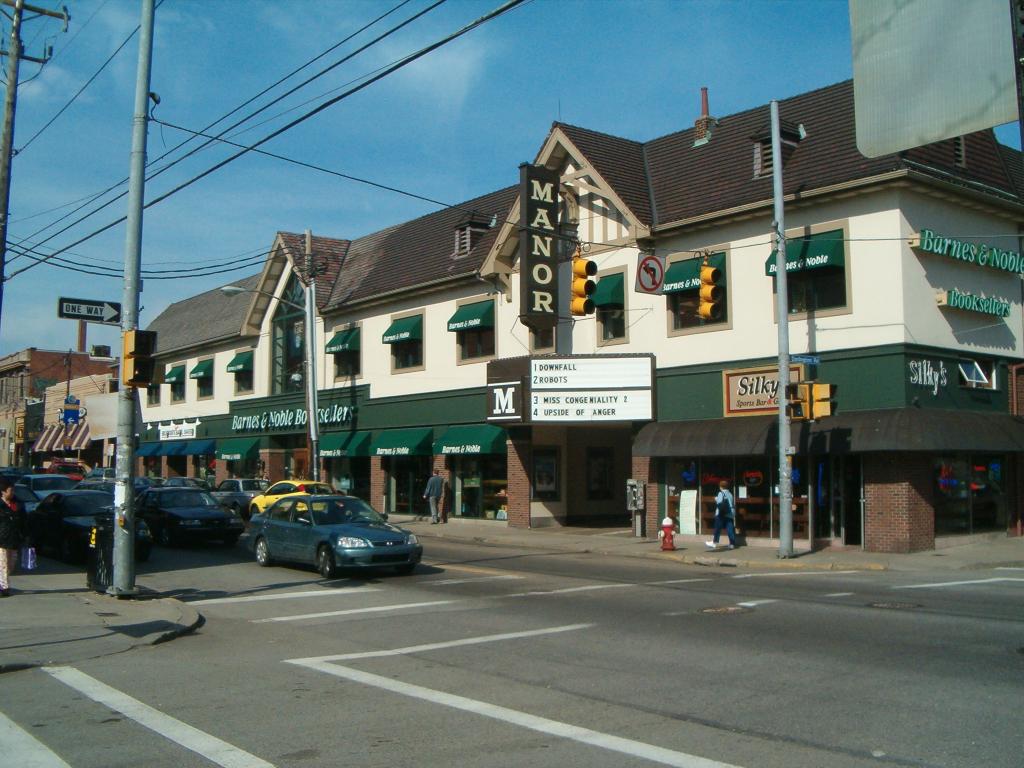
Squirrel Hill
Squirrel Hill is a residential neighborhood in the East End of Pittsburgh, Pennsylvania, United States. The city officially divides it into two neighborhoods, Squirrel Hill North and Squirrel Hill South, but it is almost universally treated as a single neighborhood.
For the neighborhood in Philadelphia, see Squirrel Hill, Philadelphia. For the archaeological site east of Pittsburgh, see Squirrel Hill Site.
Squirrel Hill
3.89 sq mi (10.1 km2)
26,473
6,800/sq mi (2,600/km2)
1.222 sq mi (3.16 km2)
11,363
9,300/sq mi (3,600/km2)
2.671 sq mi (6.92 km2)
15,110
5,700/sq mi (2,200/km2)
1010–1201 Murray Hill Avenue (Squirrel Hill), Pittsburgh, Pennsylvania, USA
April 3, 2000[3]
2004[4]
Geography[edit]
Squirrel Hill is located at 40°26′17″N 79°55′23″W / 40.438072°N 79.922972°W and has two ZIP codes: 15217 and 15232.
Surrounding neighborhoods[edit]
Squirrel Hill North has five borders with the Pittsburgh neighborhoods of Shadyside to the north, Point Breeze to the east, Squirrel Hill South to the south, Central Oakland to the southwest and North Oakland to the west.
Squirrel Hill South has nine land borders with the Pittsburgh neighborhoods of Squirrel Hill North to the north and northwest, Point Breeze to the northeast, Regent Square to the east, Swisshelm Park to the southeast, Glen Hazel and Hazelwood to the south-southwest, Greenfield to the southwest, and South Oakland and Central Oakland to the west. Across the Monongahela River to the south-southeast, Squirrel Hill South runs adjacent to Homestead.
History[edit]
Origins[edit]
The name "Squirrel Hill" may have been given to the area by the Native Americans who lived in its vicinity.[11] The neighborhood most likely was named for the abundance of black squirrels.[12]
The growth and development of Squirrel Hill was initially focused on the riverfront along the Monongahela River. The first recorded house was built in 1760 by a soldier at nearby Fort Pitt, Colonel James Burd, at a place called Summerset on the Monongahela River. Squirrel Hill's next house was built by Ambrose Newton some time in the 1760s. This house is still standing and is located in what is now Schenley Park along Overlook Drive (near the ice skating rink). Its first "business district" was the intersection of Brown's Hill Road and Beechwood Boulevard.
In 1778, John Turner built his estate of Federal Hill nearby (along what is now Beechwood Boulevard). He later established the Turner cemetery in 1838 inside his estate, which he donated to the local community when he died in 1840.[11] This cemetery holds the remains of many of the original settlers of Squirrel Hill. The Mary S. Brown Memorial Methodist church was also built on adjoining lands donated by Turner. This church was rebuilt several times, but the current building, which dates from 1908, is the oldest standing church in Squirrel Hill.[13]
The third house in Squirrel Hill, Neill Log House, was built by Robert Neill around 1765, also in what is now Schenley Park. This house still exists and is occasionally open to the public. The Neills owned 262 acres (1.06 km2) of land in the northern section of Schenley Park. In 1795, the Neills moved from this house to a location in what is now Market Square in downtown Pittsburgh. After they died, the house was handed down to two different people before it was sold to General James O'Hara. O'Hara's granddaughter, Mary Schenley, gave the property to the city of Pittsburgh in 1889. For a time, the house was rented out by the city to vacationers, but by 1969, the house was in such poor condition that it was dismantled and rebuilt by the Pittsburgh History and Landmarks Foundation. It still exists and is open for tours during the Vintage Grand Prix in July.
Around 1820, William "Killymoon" Stewart built one of the first tavern/inns in the area. His tavern, located near the intersection of Beechwood and Brown's Hill Road, survived for over 100 years. Slowly, Squirrel Hill became a prosperous and affluent suburb.
Around 1840,[14] the Murdoch family started[15][16] a farm and nursery business in the part of Squirrel Hill North which is known today as Murdoch Farms.[17][18][19] Today, this quiet area contains many upscale homes.
By the 1860s, the area along Fifth Avenue near Woodland Road had several mansions, including Willow Cottage. The cottage was built by the industrialist and civic leader Thomas M. Howe, a bank president and member of the U.S. House of Representatives from 1851 to 1855. Though neglected for many years and almost torn down, Willow Cottage has recently undergone a $2.2 million restoration and renovation into a Chatham University gatehouse and guesthouse.
Cultural life[edit]
Squirrel Hill's business area along Forbes and Murray avenues is referred to as "upstreet" (a contraction of "up the street") by locals. In addition to the many retail businesses in the neighborhood, there are a number of longtime, non-profit organizations, including a branch of the Carnegie Library of Pittsburgh, the Jewish Community Center of Greater Pittsburgh,[23] the Jewish Family & Children's Service of Pittsburgh,[23][24] the Children's Institute of Pittsburgh,[23] and the Squirrel Hill Urban Coalition.[25] Many annual events are hosted in Squirrel Hill by various community organizations.
Local government[edit]
The neighborhood is represented on Pittsburgh City Council by Corey O'Connor (District 5, Squirrel Hill South) and Erika Strassburger (District 8, Squirrel Hill North).